
Alicia DeLarge (she/her) is a production designer who has maintained many driving inspirations throughout her career, but especially to uplift those around her, enabling them to see paths like her’s as possible. Get ready to be inspired by her experience, talent, work ethic, and motivations. DeLarge contributes her success to the strong men and women in her life, who made space for her to grow, expand, and influence. She speaks to the role of serving others, but also to that of speaking out. She stresses the importance of sharing access to resources and therefore to power within her community. Read about her experiences with diversity on set and how the community of filmmakers in Philadelphia is evolving.
Written and Edited by Kate Feher
_______________________________________________________________________________________________________________________
Alicia DeLarge: My name’s Alicia DeLarge, and I am a production designer by trade. I’ve served many roles though. I’ve been a Production Designer, Set Designer, Prop Stylist, Prop Designer, Wardrobe Stylist. I’ve also served as a PA, of course, for many different departments. So, I’ve assumed many roles in the film industry, but now I’m now being recognized as a Production Designer, which I’m really proud of.
Kris Mendoza: How did you get started in this industry?
Alicia DeLarge: I originally went to Spelman College in Atlanta to study English. My plan was to be a journalist and start a PR firm. When I came home from school I attended CCP with hopes to obtain my Associates degree and transfer to Temple University. One of my good friends from Spelman, Dyandra Brown, was a stylist on set in New York, styling women such as, Jacqui Reid on NBC, and working on a lot of TV shows as a Wardrobe Stylist. She would call me often to be her assistant, people naturally liked how I dressed and would want me to do costume design, or wardrobe styling. I figured I would see what this world was all about.
Although I was on set serving as a Wardrobe Assistant and Wardrobe Stylist, I realized I wanted to be a Set Decorator in the Art Department. I was already becoming a vintage dealer, and designing trade shows and retail stores with Search & Rescue. I was also the person that would set up my all friends’ and family parties; and I was doing a lot of location scouting without even knowing I was doing it.
On Instagram, I would post pictures of places I explored. I was all over the city, going into abandoned properties, or graffitied up areas. My friends would want to use them for their shoots so I would tell them where it was, or I would go with them to show them the locations. I was basically doing location scouting and management without knowing it, and then I realized I could charge people for it.
Alicia DeLarge: That evolved into actually going into local businesses, and talking to owners proposing, “Hey, my friends want to shoot here. This is their mission. This is their purpose. We’re students …” and I would get these amazing locations for free, and we would do these really cool shoots. While working on set with Dyandra, I was doing a lot of wardrobe styling and costume design I would talking to the art department while I’d be on set. I would find the Props Master, or the Set Decorator, or the Set Dresser, and ask, “Can I connect with you? Can you tell me how to get into this?” So that’s how it started. It really started through working in the wardrobe, and costume department.
Kris Mendoza: It’s always interesting to hear about someone’s path, because there’s no one right way – can you share for yourself, culturally, if there was a stigma that comes from your end, from family, and friends, to switch gears and pursue this career path?
Alicia DeLarge: My friends were always supportive of my career choice. Most of my friends are artists, but my parents were kind of tricky. Both of my parents are artists, naturally. My mom paints on canvas, and draws, but she ended up having a baby when she was 17, so she couldn’t really pursue that in the way that she wanted to. She went into computer science and ended up working in corporate America. My father is also a designer. He was making prom dresses in high school, and making my mom clothes when they were dating.
Both of my parents are extremely art driven/artistic, but of course their generation stressed getting a good, stable job with a pension. They couldn’t really pursue any of there artistic aspirations, because it didn’t really make money. That was kind of what they projected onto me. When I said “I’m going be a designer, I’m seeing people really do this, and they’re making money, so I can do this too.” My parents weren’t really supportive of it at first. My dad used to think I was just a silly little girl, going to thrift stores wasting time, when I was really shopping, building sets, and getting paid to do it.
It took outside validation, and my hustle in and of itself, for my parents to really respect what I was doing, which I’m grateful for. When I got pregnant with my son, they actually helped me go back to school for Film Design and Production at the University of the Arts in Philadelphia, PA. Only because I had done this for years before, were they able to really take me seriously. Frankly, my parents were grateful to support me due to seeing me do things they didn’t set out to do or think they could do, due to being products of their generation.
So no, the support wasn’t there originally, but is now. I always tell kids, you have to just do it. You have to be consistent at it, and you’ve got to try not to care, because people are going to make you feel ridiculous sometimes about the things you want to do.
Luckily I’m a part of a generation that supports freelancers, you know what I mean? We don’t have social security like our parents did, so we all have to figure something out for ourselves, to survive.
Kris Mendoza: Were there any role models for you who paved the way, or was there a blueprint for you, of someone you aspired to be?
Alicia DeLarge: Honestly, as a black female Production Designer, no. There aren’t many black Production Designers. I have yet to meet another female that does what I do, even a black male, although I’m sure that there is, I just haven’t met any yet. I think my first role model coming up was Spike Lee to be honest. I actually got the chance to work with him and saw how involved he is in every aspect of production.. He’s the costume designer, the production designer, the director, — he’s everything — in which case, watching him work allowed me to see a black, male artist working on set, giving a lot of direction, and being very serious about what his vision was, and what needed to happen on his set.
Outside of the industry, my role models were mostly, my father, and other people in my life that I saw creating things for themselves. Even my friend Dyandra, as mentioned earlier, was a huge role model for me, because she was somebody that was close to me in age, who I saw stepping out, creating something for herself. For her to take me with her, was extremely encouraging. The women that I keep around me are amazing. They hustle hard and are amazingly humlble. The care they have for their work is otherworldly and I appreciate it and admire them wholeheartedly. Needless to say, I have a long list of women who really inspire me.
One of my newest role models is Hannah Beachler. She was the Production Designer for Fruitvale Station, Moonlight, Black Panther, and Creed. She really caught my attention in Creed, because I knew that the locations picked were places only someone from Philadelphia would even know about. You know what I mean? It was extremely well done. She was really running the art department and had total control. I was inspired by that, and then of course she won the award for Black Panther. Visually it is one of the most beautiful movies I’ve ever seen. It feels good to know that there’s a black female Production Designer that’s being recognized for her work, and that is being validated by the public, and the masses for her work.
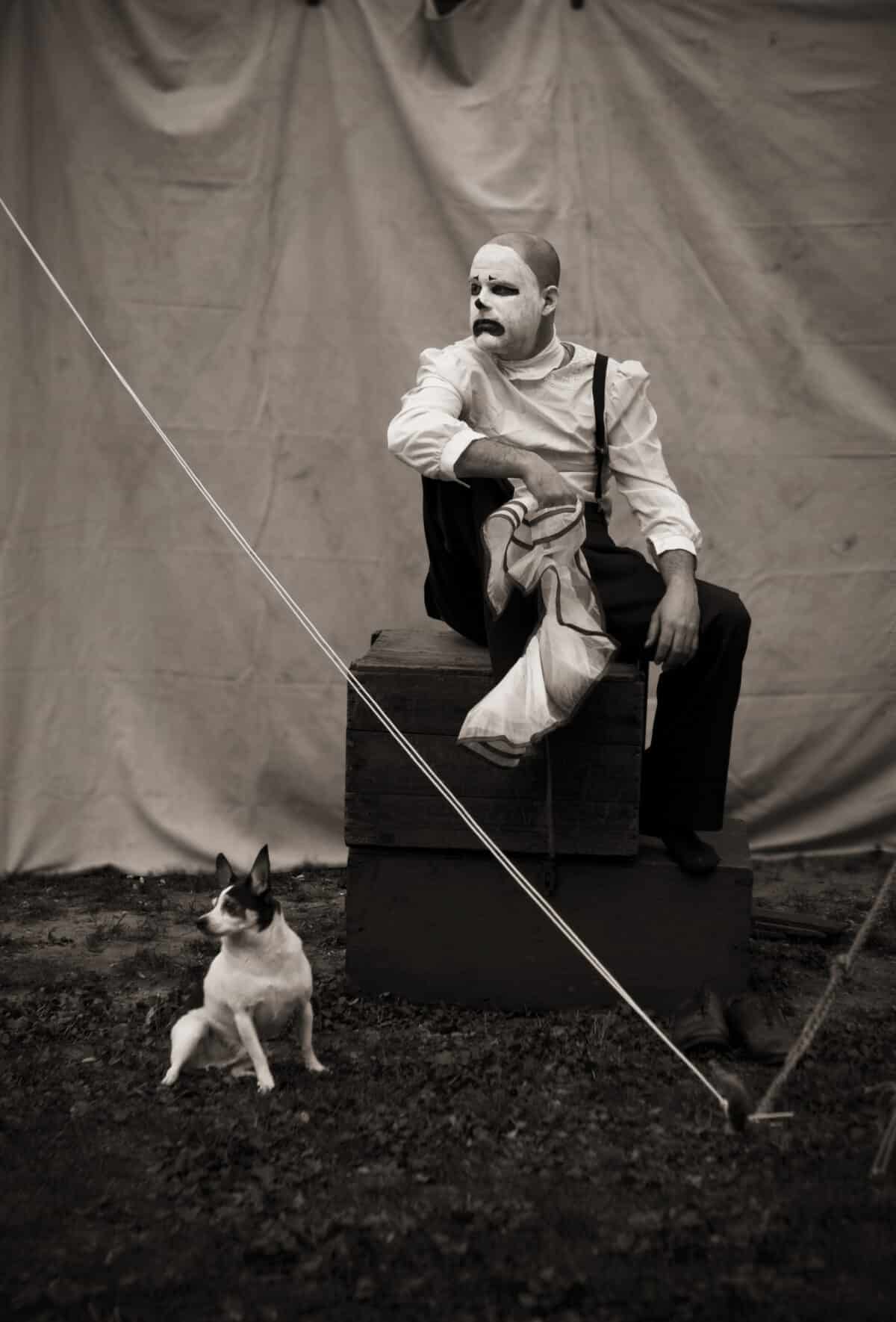
Alicia DeLarge: And of course, Tim Stevens is one of my biggest role models. I talk about him every interview I do. He’s my heart. I believe he is responsible for starting my career as it is now. By bringing me onto Concrete Cowboys. Prior to this, I was really just working in New York and LA. Once I got on that set, the (local) work just ran like water. For the rest of that season, I was on pharma commercials in the middle of Pennsylvania every week, and pharma commercials are money.
Kris Mendoza: A good launchpad for more local stuff.
Alicia DeLarge: South Jersey is booming right now too. I did a Lifetime Movie and a Giant Foods commercial out there, but Concrete Cowboys was the best and it’s about to come out on Netflix. It was one of those films where I got my hands on everything. I served as a Set Dresser and I worked under Tim Stevens, and Set Decorator, Michael Mizrahi. Tim and Michael are so hilarious ridiculous (in a good way), we just had so much fun. I got to work with horses, set dressing stables in Philadelphia and Glenolden, PA. It was amazing.
Kris Mendoza: I’m very much looking forward to seeing it when it comes out. What are you working on now? Anything really interesting?
Alicia DeLarge: So I just finished working on a lot of big projects, this is my slow season. I am currently applying to a graduate program in London and I’ve been working with Draulhaus, creating a lot of Angry Orchard commercials with them which has been really fun. Last year, I worked on a Lifetime movie with Meagan Good, called Death Saved My Life. It actually just premiered February 13th, , and I served on that as a Set Decorator. That was my first feature film where I served as a set-dec from beginning to end. I worked under a Production Designer named Luie Garcia, who is a woman of color. It was definitely hard, but a good experience, because I learned a lot about what I am able to handle without a lot of support.
I production designed my first documentary. We traveled to New York, Philadelphia, D.C., and Delaware, and that was extremely rewarding, because I couldn’t be on set for any of it, I was working on the Lifetime movie at the same time. Black History Untold, by Sofiya Ballin, is about black love… the radicalism, the revolutionary nature of black love. I was super honored to be able to create the environment for a project such as this. I created a set that was able to travel to four different cities without me. All they had to do was lift it up, put it on a backdrop pole, and put a couch down. I was just extremely proud of myself and the way that I was able to pre -set it, how simple it was for the people in every city to just set it up for me, and I was available on FaceTime, so I was able to guide and give direction without being physically present.
Also, I served in the costume department for Mare of Easttown, with Kate Winslet, doing a lot of costuming for background. I felt like I was on set for The Devil Wears Prada. We would dress everyone, they would run in, line up….
Kris Mendoza: Rolling racks full of wardrobe….
Alicia DeLarge: Yeah, and the Costume Designer would just walk up and down and look at everyone deciding, “You, yes. You, no. Go get her a hat, go get her this….” It was so inspiring. One of my goals, in the role that I have, is to place a lot of black designers and black artists within the sets that I work on. So this was also the first time that I had that much influence on a set. For example, my friend Dyandra Brown just recently launched a vegan shoe line, so I had her shoes in the closet, and they got so much playtime. And then my friends, Rosco Spears, who did this tapestry I have in my apartment, and my friend Aubrie Costello, I got their work on the project, front and center. So it feels really good to be able to give my friends this type of exposure. Artists and designers are necessary, and people need to see their work, you know?
Kris Mendoza: That’s huge. Got your own Project Forte going on a day-to-day basis. Great to have influence like that on a project and uplift people you know are worthy of it. But also, someone gave you that opportunity to launch, there’s nothing more gratifying than having the opportunity to pass it on.
Alicia DeLarge: My mission in any capacity of my work, whether or not it’s film, is to serve black men specifically, women, and students. So anything that has to do with those three demographics, I’m always here for.
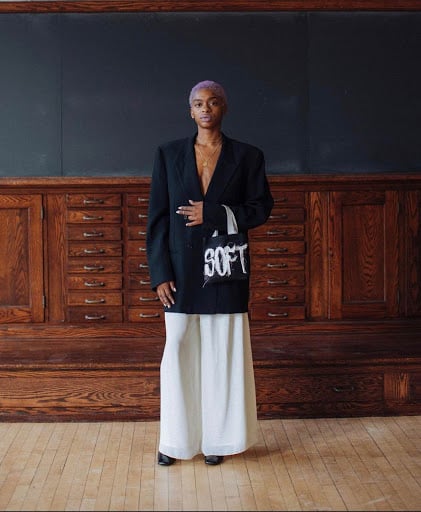
Kris Mendoza: You talked about notable projects as of late, and we touched on it a little bit in terms of role models, but what’s the current state of ethnic diversity on film sets?
Alicia DeLarge: I love this question. I still don’t think there’s enough representation behind the camera, but what I know is, it’s a process, so I think it’s amazing that I’m seeing more representation in front of the camera in this season. Sometimes of course I think it’s only because we’re in this black lives matter era, and people feel very inclined to be more inclusive. I have some friends who are annoyed about it, who have gotten promotions at work, but say, “They only did this because I’m black.” To which I say, “Well, take it. Why are you mad about that? This is something that you should’ve had years ago.”
Kris Mendoza: This is what we’re fighting for..
Alicia DeLarge: Yeah, “you should’ve had this years ago, and now you’re mad about it? Just embrace it, and use it to the best of your ability,” you know what I mean? I get where they’re coming from, because it should have always been like this. But on set specifically, no, I don’t think there’s enough representation behind the camera. For instance, I recently worked on a Lifetime commercial and noticed the talent was black, but looking around set, there were still a lot of white men giving direction. They did have a white female director, but she was not really taking over in ways that I believe she could’ve
Kris Mendoza: So playing second fiddle.
Alicia DeLarge: Yes. Basically the DP was a white male, calling all the shots. I once worked on a lip plumper commercial where everyone on set and behind the camera was a white man, giving direction for something that’s made for women, that also didn’t make sense know what I mean?
The most representation I’ve seen on set was the Lifetime movie in which almost every department head was either a black woman or male, or a woman of color, which was extremely encouraging, and I made sure I talked about it all the time. Even the talent was black, so it was great to see representation on both sides. I’d point it out saying “hey ya’ll, do you understand that we’re all here, we’re all black?” And they were like, “Alicia, thank you for saying that.”
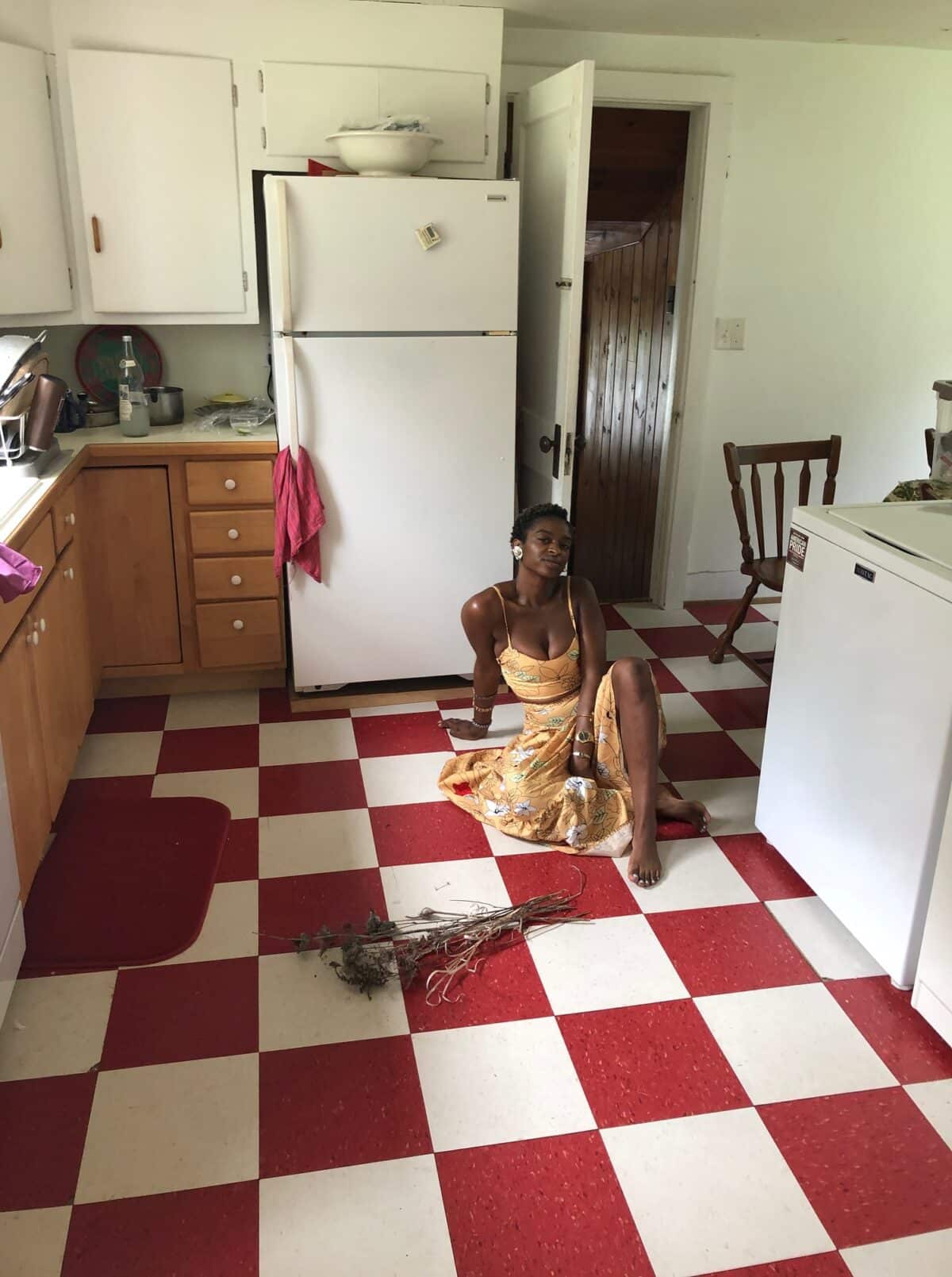
Kris Mendoza: Just like you’re aware when you’re the only non-white person in the room, you become aware, there’s not one white person in the room.
Alicia DeLarge: So the director was a white male, but his assistant was a black woman. I’ve never in my life seen this before, but we had an all-black male G&E [grip & electric] from D.C. It was very encouraging. And then, Concrete Cowboys.
The first day we show up to set, I remember it was not diverse. Like you show up to set, and everybody’s white, even the director. Everybody was white, coming together to tell black stories. Come to find out, Lee Daniels actually put a clause in his contract with Neighborhood Film and requested diversity on set, at least that’s what I heard. I remember showing up to set the next day, because every department had changed. G&E crew was mostly black. I saw color everywhere, and not just in front of the camera. The art department was headed by my mentor, Tim Stevens, I tell him often , “Every time I work with you, I work with a badass beautiful women.”
Kris Mendoza: It’s crazy how quickly he (Lee Daniels) was able to turn that around.
Alicia DeLarge: I’m sure he would’ve shut it down. But once again, we’re starting to see more color in front of the camera. I affirm Draulhaus on their intention to carry that out all the time. We were on a set the other day, and John (from Draulhaus) says, “I can’t wait to do more creative stuff, I don’t feel like I’m impactful.” This man goes out of his way to hire women, and black women like me to be in lead production roles. I said, “That’s extremely impactful, I don’t want you to take that for granted. You are a white male that is making room for a lot of people like me, and that’s what it takes.”
I affirm Tim Stevens because even on Concrete Cowboys, the director would’ve never even known who I was if Tim didn’t give me room. There was this one moment where I had showed up at a location they were trying to create this chase scene through a made-up alleyway, which was confusing to me because this is Philadelphia and it’s full of alleyways. But Tim said, “This is what they want, so this is what we’re going to do.”
I remember saying: well, “I don’t think it’s a good idea.” I’m very outspoken, especially with Tim, because he just makes me feel comfortable to speak. “We should use this other side.” And Tim asked me to tell him why.
Alicia DeLarge: When we did the walkthrough, Tim brings up my suggestion but he actually can’t quite speak to it, because it was my idea. He kind of tripped over his words so I just started talking, “Tim is trying to say that it’s way more cinematic, there’s more room. There are layers and levels, and all these things…” just giving the whole spiel. People looked at me crazy because I’m a black girl on set that nobody knew.
Alicia DeLarge: Ricky liked the idea and asked, “What’s your name?” I said Alicia and he cleared it with the Locations department. After their approval he said, “Okay. It’s done. We’re going to shoot it over here.” And then we just moved on, and I look at Tim surprised, but that’s what it takes, more white men and women humbling themselves, or taking a backseat to allow people of color to have a chance.
Kris Mendoza: It’s creating space.

Kris Mendoza: So, what needs to happen in order to get more opportunities for people of color to open up? You could say on one hand, by looking at the Oscars and the Golden Globes, there aren’t as many black or Asian films being submitted. But I don’t think there’s a shortage of those, it’s just more like the status quo has to make room for other folks. So you need those white men or women allies to cede some of that power.
Alicia DeLarge: Totally, and it’s happening more, like I said. I’m working with La Colombe right now, which I always looked at as a vanilla-ish corporate company, but they’re pushing a lot of inclusivity right now, and elevating a lot of black people
Kris Mendoza: Well, if you didn’t know, Todd Carmichael, the owner and founder of La Colombe, is a father to four beautiful black adopted kids. So I’m sure that is intentional coming right from the top.
Alicia DeLarge: That’s beautiful. I didn’t know that! They recently reached out to me to promote an initiative they’re doing with the Loveland Foundation to give black women free therapy, which is a personal initiative that I have. I often pay for people to go to therapy because I think it’s super important. They wanted to pay me for my work in various ways, but what I asked was for them to hire more black and brown people to work with them and to pay them their rates. I gave them a list of black creatives in the city that I admire to start with.
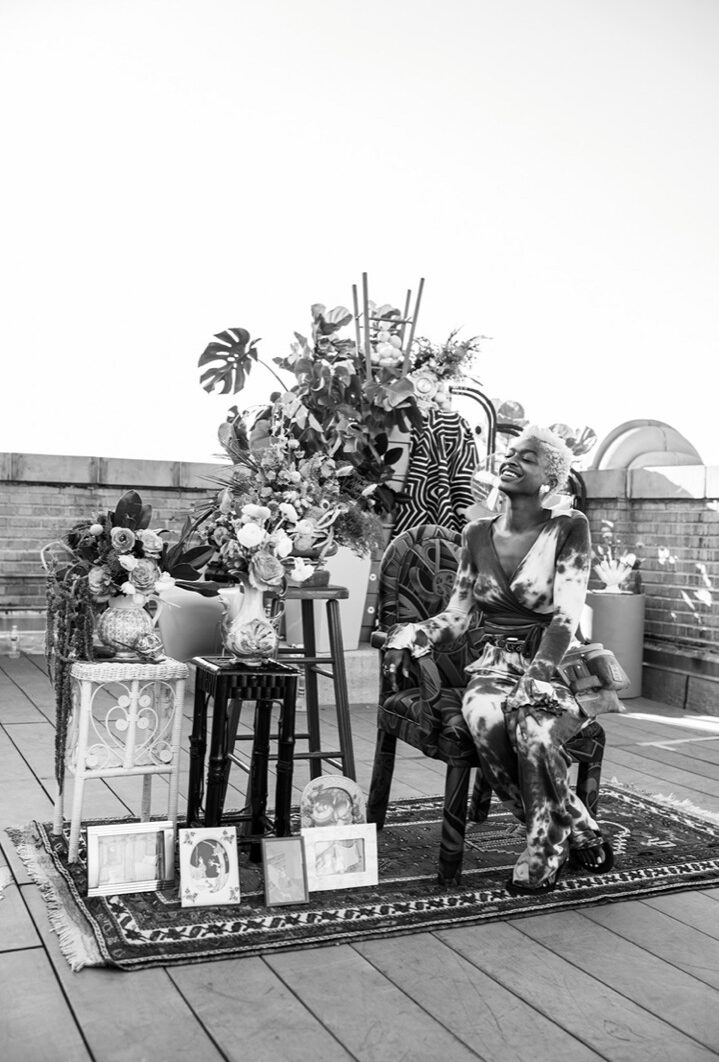
Alicia DeLarge: They were shocked. They had never heard anybody request something like that over capital. But that’s what’s going to support me, caring for a community of people that I love. I plan to challenge more companies because that’s what it takes. I notice that sometimes, even people of color get to a certain height in their career, and then they don’t want to bring anyone with them anymore….or they feel like they have to hold on so tight.
Kris Mendoza: Do you think there’s a level of thinking “I’m a person of color, I got here and have my scars, and you’ve got to do the same thing?”
Alicia DeLarge: Yes I do believe that level of thinking is prevalent due to the experiences I’ve had working under older people of color. It is always as if there is a hazing process I have to undergo to earn their love and respect. I don’t have to go through this working under white men honestly and it’s disheartening that I have to deal with this working under older black men and women.
I don’t put the girls who work under me through things like that just for them to learn, or have an experience. And there’s also a level of insecurity and ego that is prevalent right? Older people don’t want you to take their job. They’re afraid. Although your goal is truly to support, elevate, and learn from them. It’s interesting to say the least.
Kris Mendoza: There’s no clear antagonist here other than racism, and lack of equality. Our inclusivity is adding different perspectives, and enriching the conversation.
Last question for you. how do you define success, in terms of what you do? This is Black History Month and you’re making black history on a daily basis yourself. What’s that responsibility like, knowing there may be a young black boy or girl thinking this is not a career path for them?
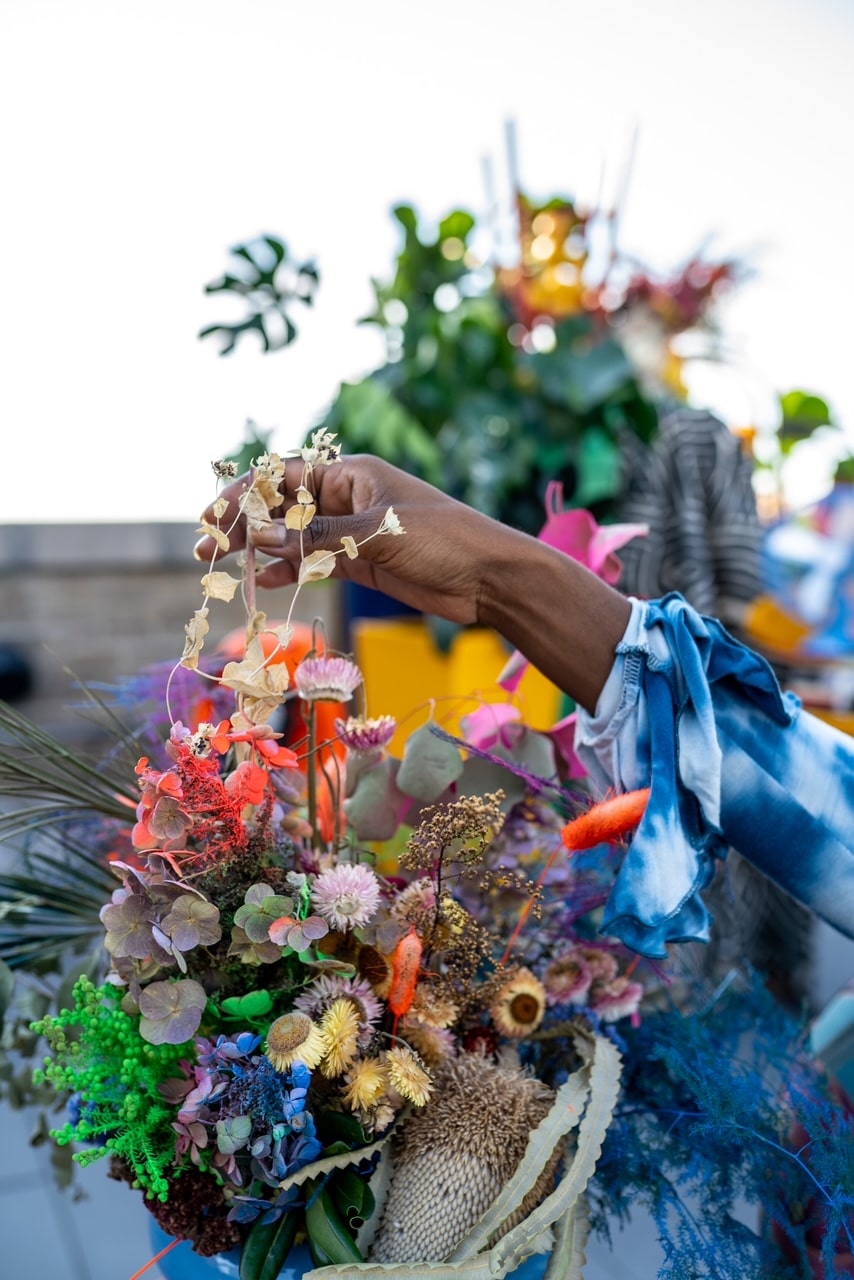 Alicia DeLarge: Well, success is what I experienced this weekend, right. I feel very successful to be able to complete something from beginning to end and have influence in various ways. So not even just being able to create a set, or being able to pick out the things I want to decorate a set, which is definitely having influence, but also the fact that I was able to get my friends’ work included and to be able to elevate other people. When I’m on set, I’m constantly encouraging people. I want them to feel good, feel cared for, feel comfortable… That’s just the type of person I am.
Alicia DeLarge: Well, success is what I experienced this weekend, right. I feel very successful to be able to complete something from beginning to end and have influence in various ways. So not even just being able to create a set, or being able to pick out the things I want to decorate a set, which is definitely having influence, but also the fact that I was able to get my friends’ work included and to be able to elevate other people. When I’m on set, I’m constantly encouraging people. I want them to feel good, feel cared for, feel comfortable… That’s just the type of person I am.
Alicia DeLarge: On my last day of work on the Lifetime movie, I went around and gave every black woman flowers. Black women don’t tend get our flowers while we can still smell them. That felt successful for me, to be on a set, have influence personally and professionally, and elevate other people while I was there.
I feel the most fulfilled when I’m serving people. Even in the role that I have as a production designer, I’m always serving someone, and that makes me think of my father who always talks about being a ”servant leader.”
I remember growing up, he would always, whenever he would have these conversations with his friends talk about his role at work, he would say “I’m the advisor to the king. That’s the role that I have. I have a lot of influence, but I’m also in a very humble position, where I’m able to advise people in a more elevated and powerful role than me.” I’m in a supporting role, and I’m grateful for the quiet influence that I’m able to have on a set.
I don’t believe for one minute that I’m the first black woman that’s ever decorated a set, or anything like that, because I’m not. But to be able to be recognized in that role, which is usually held by white men, is extremely empowering.
I did a career day at Mastery Charter a few years ago, where I was able to see how important it was for black children to know that they could do what I do. I actually started substitute-teaching in between my jobs as a result of that experience.
I’ve also been doing this Brown Girls series with a group called Mighty Writers, where I have the opportunity to talk to a group of girls from ages 11-13 last weekend about what I do for a living, and their minds were blown. I was talking about Spider-Man, and asking them, “who do you think decorates Spider-Man’s room? Who puts the pictures on the wall? Who makes his bed? Me!” They all got a kick out of that!
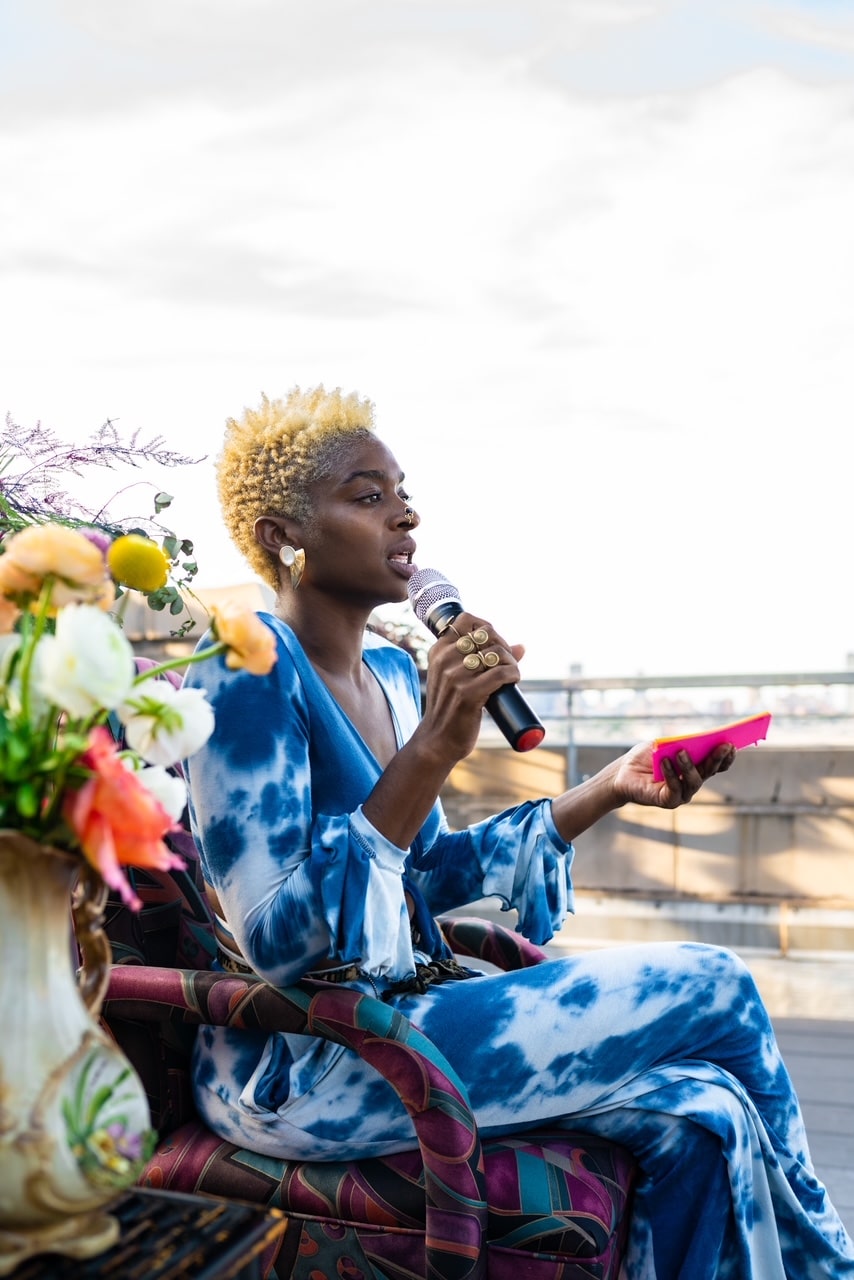
It’s extremely empowering, and it gives me more purpose to my work. I’m not just doing this for me, I’m doing this for my son, I’m doing this for all these little black kids. Even being on Concrete Cowboys was very emotional for a lot of us, because it shows little black kids they can get on horses, you know what I mean?
It’s a rarity — when you think about horses, you think about equestrians, white people on their horses, the Kentucky Derby. But black people have been owning horses in Philadelphia for decades and kids should see that.
I’m extremely blessed to be an example to other kids, to be able to show them what’s possible for them. I’m all about showing people, especially black people, what we have access to, because that’s power.


